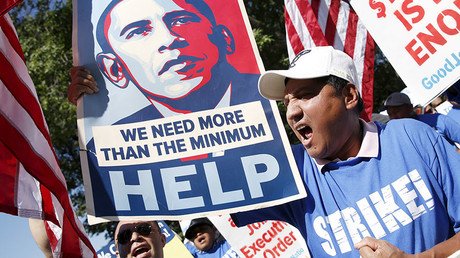Obama’s new mandate will boost overtime pay, but small businesses could feel pain

The federal government issued new regulations that will require overtime pay for millions of workers who previously did not qualify for it. However, the change could force small businesses to reduce the amount of hours that certain employees work.
The Department of Labor issued the new rules on Wednesday that will increase the overtime salary threshold. Starting December 1, workers earning below $47,476 a year will now be required to receive time-and-a-half pay whenever they work more than 40 hours in a week.
This doubles the current salary threshold of $23,660, and the Labor Department will update the cap every three years, to keep pace with inflation.
The overtime salary threshold was last updated in 2004, and under current rules covers only 7 percent of full-time workers in the US, according to the government. In 1975, however, 62 percent of workers qualified, and the new rules will boost this number back up to 35 percent, according to Labor Secretary Tom Perez.
“The overtime rule is about making sure middle-class jobs pay middle-class wages,” Perez, who spearheaded the Obama administration’s efforts on the rule, told reporters. “Some will see more money in their pockets... Some will get more time with their family … and everybody will receive clarity on where they stand, so that they can stand up for their rights.”
Employers can classify workers as “managers” if they exceed this meager threshold to easily avoid overtime pay requirements, even though they don’t make much more than the people they supervise, but the new limit will force businesses to put far fewer workers in this category.
Many small businesses like restaurants and retailers will have to move many employees out of the more desirable, salaried manager category and start paying them by the hour.
Small business owner Chad Brooks says that he can see the new classification requirements leading to problems with customer service.
“Guests will be extremely frustrated when they ask, ‘where’s the manager,’ and a worker says, ‘he’s not here,’” Brooks told the Associated Press.
Business groups fear that the new regulation will simply result in businesses cutting hours and being burdened with paperwork and scheduling issues that did not exist before.
“With the stroke of a pen, the Labor Department is demoting millions of workers," David French, a senior vice president for the National Retail Federation, told Fox News. “Most of the people impacted by this change will not see any additional pay.”
Junior scientists, researchers who recently received a doctorate and work in a more senior scientist’s lab in order to gain experience, will also be affected by December’s overtime regulations, since their average annual pay is $45,000.
“Under the new FLSA overtime threshold, universities, teaching hospitals, and other institutions that employ postdocs have a choice: they can carefully track their fellows’ hours and pay overtime, or they can raise their salaries to levels above the threshold and thereby qualify them for exemption,” National Institutes of Health Director Francis S. Collins wrote in a joint op-ed with Tom Perez in the Huffington Post on Tuesday.
“Biomedical science, by its very nature, is not work that neatly falls into hourly units or shifts,” the article continued. “So, from our vantage point, it seems that the only option consistent with the professional nature of scientific work is to increase salaries above the threshold.”
The GOP-controlled Congress may not be on board with the new rule, but it’s a considered to be a regulatory change that is under control of the executive branch, not a new law that is in the purview of the House and Senate.














